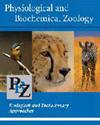对城市热岛的适应提高了陆地等足动物在慢性热胁迫而非良性条件下的热性能
IF 1.8
3区 生物学
Q3 PHYSIOLOGY
引用次数: 3
摘要
在城市热岛条件下,发育过程中的慢性热应激对热性能性状的影响尚未得到很好的表征,尽管这些条件与生物如何体验城市环境具有生物学相关性,并且热性能性状与适应性之间通常存在很强的联系。本文以陆生等足类蛇尾蛇为研究对象,研究了发育过程中慢性热应力对城乡等足类动物自主奔跑速度的影响。采用室内普通花园试验设计,采用2种发育驯化温度处理(21°C为良性处理,29°C为胁迫处理)和3种试验温度处理(19°C、31°C、40°C);我们测试了城市和农村人群在每种温度组合下的跑步速度。我们发现,在29℃的发育驯化条件下,城市和农村等足类动物在三个测试温度下的奔跑速度都比21℃降低。然而,重要的是,在29℃发育驯化条件下,城市等足类在较低的两个测试温度下比农村等足类具有跑步速度优势。在21℃的良性发育驯化条件下,没有发现种群差异。城市等足类动物耐热性的提高进一步支持了对热应激适应的解释。然而,在最高测试温度下,城市和农村等足类动物的跑步速度趋同表明了适应的潜在限制或约束。我们的研究结果表明,对城市热岛的热适应可以减轻慢性发育热应激的负面影响,即使与良性条件相比,整体性能降低。本文章由计算机程序翻译,如有差异,请以英文原文为准。
Adaptation to Urban Heat Islands Enhances Thermal Performance Following Development under Chronic Thermal Stress but Not Benign Conditions in the Terrestrial Isopod Oniscus asellus
The effects of chronic thermal stress during development on thermal performance traits are not well characterized under urban heat islands, despite these conditions being biologically relevant for how organisms experience the urban environment and the often strong linkages between thermal performance traits and fitness. Here we use the terrestrial isopod Oniscus asellus to examine the effects of chronic thermal stress during development on voluntary running speed of urban and rural isopods. We used a laboratory common-garden experiment design with two developmental acclimation temperature treatments (21°C, a benign treatment, and 29°C, a stressful treatment) and three test temperatures (19°C, 31°C, 40°C); we tested running speed of individuals from urban and rural populations under each of the temperature combinations. We found that for both urban and rural isopods, running speed across three test temperatures was reduced under developmental acclimation conditions of 29°C compared with 21°C. Importantly, however, urban isopods had a running speed advantage over the rural isopods under the 29°C developmental acclimation conditions at the lower two test temperatures. No population differences were detected under benign developmental acclimation conditions of 21°C. The evolution of higher heat tolerance in urban isopods further supported the interpretation of adaptation to heat stress. Convergence of urban and rural isopod running speed at the highest test temperature, however, suggests potential limits or constraints on adaptation. Our results indicate that thermal adaptation to urban heat islands can mitigate negative effects of chronic developmental thermal stress, even when overall performance is reduced compared with benign conditions.
求助全文
通过发布文献求助,成功后即可免费获取论文全文。
去求助
来源期刊
CiteScore
3.20
自引率
6.20%
发文量
62
审稿时长
6-12 weeks
期刊介绍:
Physiological and Biochemical Zoology: Ecological and Evolutionary Approaches primarily publishes original research in animal physiology and biochemistry as considered from behavioral, ecological, and/or evolutionary perspectives. Studies at all levels of biological organization from the molecular to the whole organism are welcome, and work that integrates across levels of organization is particularly encouraged. Studies that focus on behavior or morphology are welcome, so long as they include ties to physiology or biochemistry, in addition to having an ecological or evolutionary context.
Subdisciplines of interest include nutrition and digestion, salt and water balance, epithelial and membrane transport, gas exchange and transport, acid-base balance, temperature adaptation, energetics, structure and function of macromolecules, chemical coordination and signal transduction, nitrogen metabolism and excretion, locomotion and muscle function, biomechanics, circulation, behavioral, comparative and mechanistic endocrinology, sensory physiology, neural coordination, and ecotoxicology ecoimmunology.

 求助内容:
求助内容: 应助结果提醒方式:
应助结果提醒方式:


